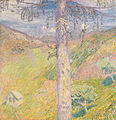Over the past few weeks, I’ve worked with several writers who had good or great ideas for both fiction and nonfiction books. Their problem? All tried to make their books too complicated.
Writing Tip for Today: Note that I didn’t say too “complex.” We want our work to be as complex as possible without getting complicated. What do I mean?
- In fiction, too complicated might mean too many characters, settings or subplots. If it’s your first novel try to keep your cast as small as possible (perhaps through combining characters), keep the setting constant where possible (don’t move readers around just for variety) and limit subplots to two.
- In nonfiction, simplifying might mean combining sections to make two weaker ones into one strong section. Or “uncomplicating” may involve rewriting to remove abstract or passive language and replace with Concrete Sensory Detail and story. Remember E.B. White’s dictum: “Don’t write about man. Write about a man.”
- In any book, the takeaway value and/or theme must be at least hinted at (in the case of fiction) or plainly stated (for nonfiction) at the beginning. Readers won’t hang on if they don’t sense a direction to the writing. You must make a point, even in fiction. Your point may not be original, but it must be present and preferably near the opening.





Great advice, Linda! I had a boss once who always said: Remember to KISS! (keep is simple, stupid!)
Or as the wonderful Lauraine Snelling puts it: Keep It Simple Sweetheart! ~Linda